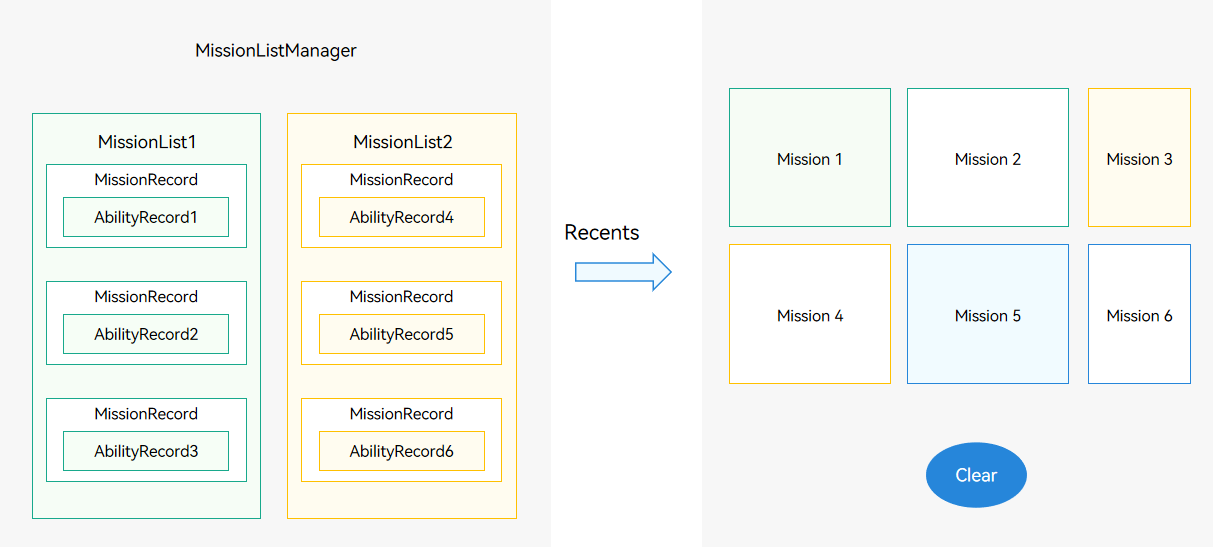Mission Management Scenarios
Before getting started with the development of mission management, be familiar with the following concepts related to mission management:
-
AbilityRecord: minimum unit for the system service to manage a UIAbility instance. It corresponds to a UIAbility component instance of an application. A maximum of 512 UIAbility instances can be managed on the system service side.
-
MissionRecord: minimum unit for mission management. One MissionRecord has only one AbilityRecord. In other words, a UIAbility component instance corresponds to a mission.
-
MissionList: a list of missions started from the home screen. It records the startup relationship between missions. In a MissionList, a mission is started by the mission above it, and the mission at the bottom is started by the home screen.
-
MissionListManager: system mission management module that maintains all the MissionLists and is consistent with the list in Recents.
Figure 1 Mission management

Missions are managed by system applications (such as home screen), rather than third-party applications. Users interact with missions through Recents. After creating a mission, users can perform the following operations on Recents:
-
Delete a mission.
-
Lock or unlock a mission. (Locked missions are not cleared when users attempt to clear all missions in Recents.)
-
Clear all missions in Recents.
-
Switch a mission to the foreground.
A UIAbility instance corresponds to an independent mission. Therefore, when an application calls startAbility() to start a UIAbility, a mission is created.
-
To call missionManager to manage missions, the home screen application must request the ohos.permission.MANAGE_MISSIONS permission. For details, see Requesting Permissions for system_basic Applications.
-
You can use missionManager to manage missions, for example, listening for mission changes, obtaining mission information or snapshots, and clearing, locking, or unlocking missions.
import missionManager from '@ohos.app.ability.missionManager'; import { BusinessError } from '@ohos.base'; import image from '@ohos.multimedia.image'; import promptAction from '@ohos.promptAction'; import Logger from '../utils/Logger'; const TAG: string = 'TaskManager';private listenerId: number = 0; private missionId: number = 0; private listener: missionManager.MissionListener = { // Listen for mission creation. onMissionCreated: (mission: number) => { Logger.info(TAG, '--------onMissionCreated-------'); }, // Listen for mission destruction. onMissionDestroyed: (mission: number) => { Logger.info(TAG, '--------onMissionDestroyed-------'); }, // Listen for mission snapshot changes. onMissionSnapshotChanged: (mission: number) => { Logger.info(TAG, '--------onMissionSnapshotChanged-------'); }, // Listen for switching the mission to the foreground. onMissionMovedToFront: (mission: number) => { Logger.info(TAG, '--------onMissionMovedToFront-------'); }, // Listen for mission icon changes. onMissionIconUpdated: (mission: number, icon: image.PixelMap) => { Logger.info(TAG, '--------onMissionIconUpdated-------'); }, // Listen for mission name changes. onMissionLabelUpdated: (mission: number) => { Logger.info(TAG, '--------onMissionLabelUpdated-------'); }, // Listen for mission closure events. onMissionClosed: (mission: number) => { Logger.info(TAG, '--------onMissionClosed-------'); } };// 1. Register a mission change listener. this.listenerId = missionManager.on('mission', this.listener); promptAction.showToast({ message: $r('app.string.register_success_toast') }); Logger.info(TAG, `missionManager.on success, listenerId = ${this.listenerId}`);// 2. Obtain the latest 20 missions in the system. missionManager.getMissionInfos('', 20, (error: BusinessError, missions: Array<missionManager.MissionInfo>) => { Logger.info(TAG, 'getMissionInfos is called, error = ' + JSON.stringify(error)); Logger.info(TAG, 'size = ' + missions.length); Logger.info(TAG, 'missions = ' + JSON.stringify(missions)); //Check whether Recents in the system contains etsclock. for (let i = 0;i < missions.length; i++) { if (missions[i].want.bundleName === 'ohos.samples.etsclock') { promptAction.showToast({ message: $r('app.string.obtain_success_toast') }); Logger.info(TAG, `getMissionInfos.find etsclock, missionId = ${missions[i].missionId}`); this.missionId = missions[i].missionId; return; } } promptAction.showToast({ message: $r('app.string.obtain_failed_toast') }); });// 3. Obtain the detailed information about a mission. missionManager.getMissionInfo('', this.missionId).then((data: missionManager.MissionInfo) => { promptAction.showToast({ message: JSON.stringify(data.want.bundleName) }); Logger.info(TAG, `getMissionInfo successfully. Data: ${JSON.stringify(data)}`); }).catch((error: BusinessError) => { Logger.error(TAG, `getMissionInfo failed. Cause: ${error.message}`); });// 4. Obtain the mission snapshot. missionManager.getMissionSnapShot('', this.missionId, (error: BusinessError, snapshot: missionManager.MissionSnapshot) => { if (error === null) { promptAction.showToast({ message: $r('app.string.obtain_snapshot_success_toast') }); } Logger.info(TAG, 'getMissionSnapShot is called, error = ' + JSON.stringify(error)); Logger.info(TAG, 'bundleName = ' + snapshot.ability.bundleName); })// 5. Obtain the low-resolution mission snapshot. missionManager.getLowResolutionMissionSnapShot('', this.missionId, (error: BusinessError, snapshot: missionManager.MissionSnapshot) => { if (error === null) { promptAction.showToast({ message: $r('app.string.obtain_low_snapshot_success_toast') }); } Logger.info(TAG, 'getLowResolutionMissionSnapShot is called, error = ' + JSON.stringify(error)); Logger.info(TAG, 'bundleName = ' + snapshot.ability.bundleName); })// 6-1. Lock the mission. missionManager.lockMission(this.missionId).then(() => { promptAction.showToast({ message: $r('app.string.lock_success_toast') }); Logger.info(TAG, 'lockMission is called '); });// 6-2. Unlock the mission. missionManager.unlockMission(this.missionId).then(() => { promptAction.showToast({ message: $r('app.string.unlock_success_toast') }); Logger.info(TAG, 'unlockMission is called '); });// 7. Switch the mission to the foreground. missionManager.moveMissionToFront(this.missionId).then(() => { Logger.info(TAG, 'moveMissionToFront is called '); });// 8. Clear a single mission. missionManager.clearMission(this.missionId).then(() => { promptAction.showToast({ message: $r('app.string.delete_success_toast') }); Logger.info(TAG, 'clearMission is called '); });// 9. Clear all missions. missionManager.clearAllMissions().catch((err: BusinessError) => { Logger.info(TAG, `${err.code}`); });// 10. Deregister the mission change listener. missionManager.off('mission', this.listenerId, (error: BusinessError) => { if (error === null) { promptAction.showToast({ message: $r('app.string.unregister_success_toast') }); } Logger.info(TAG, 'unregisterMissionListener'); })